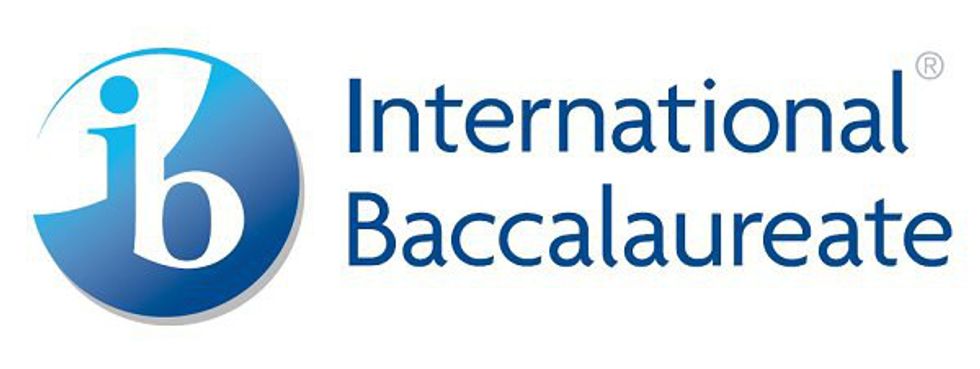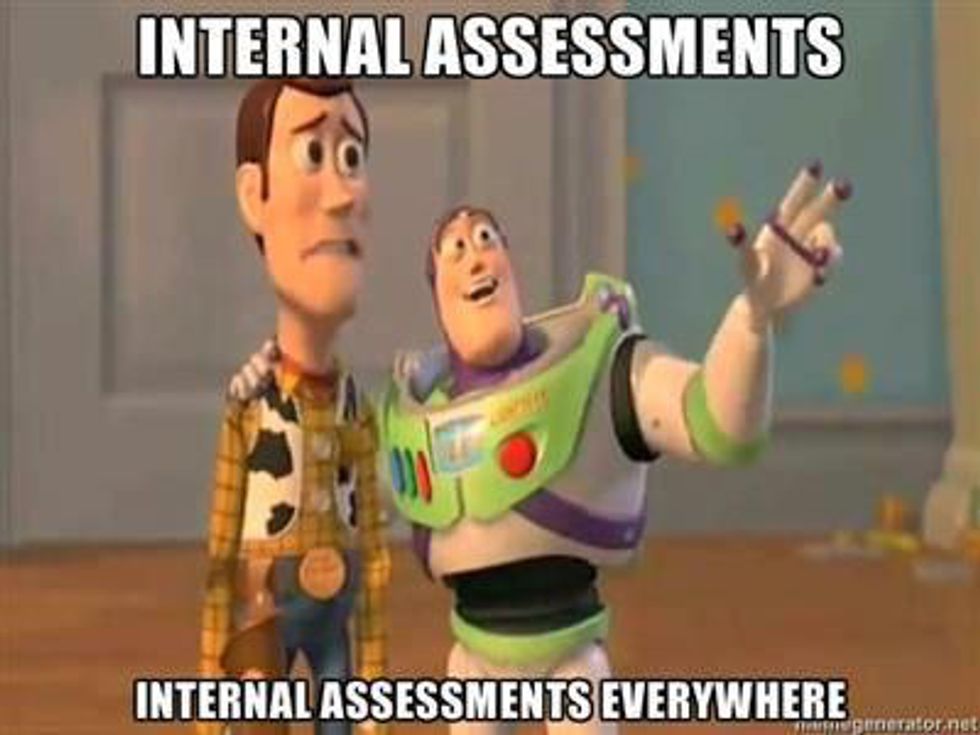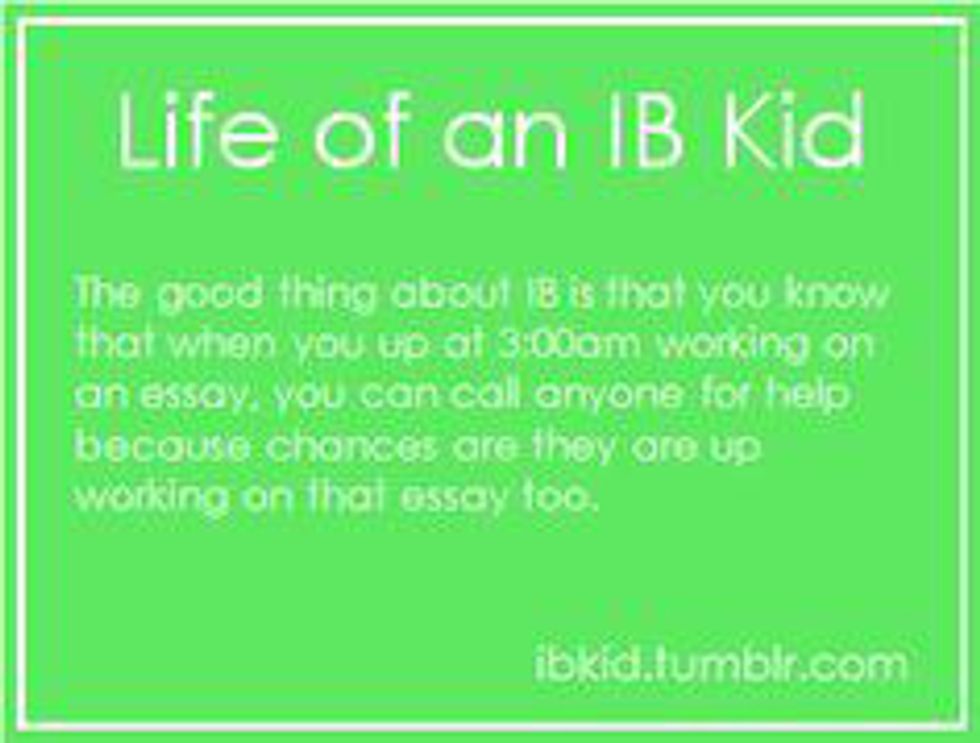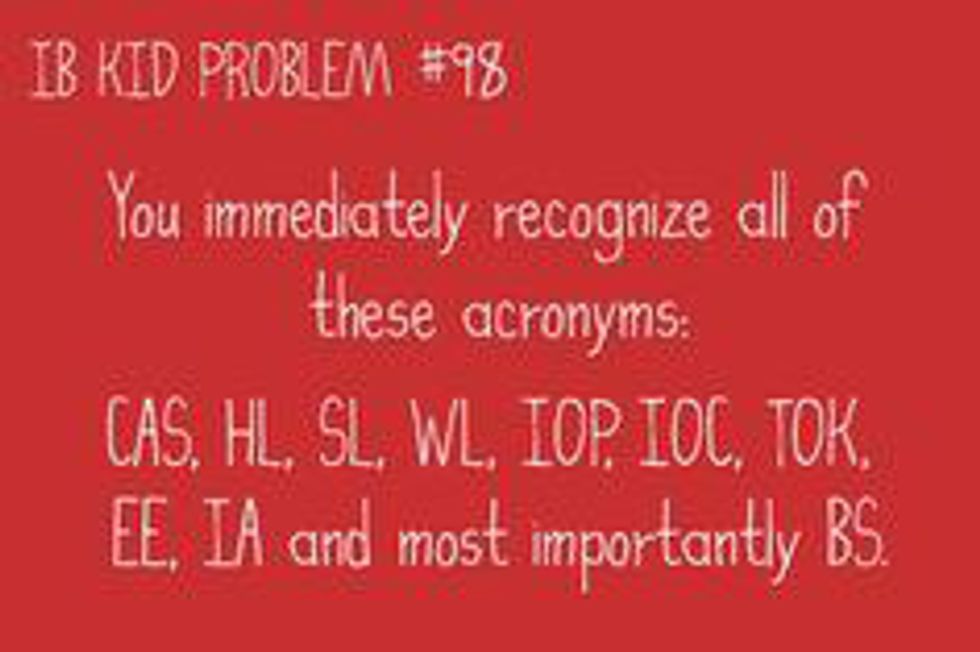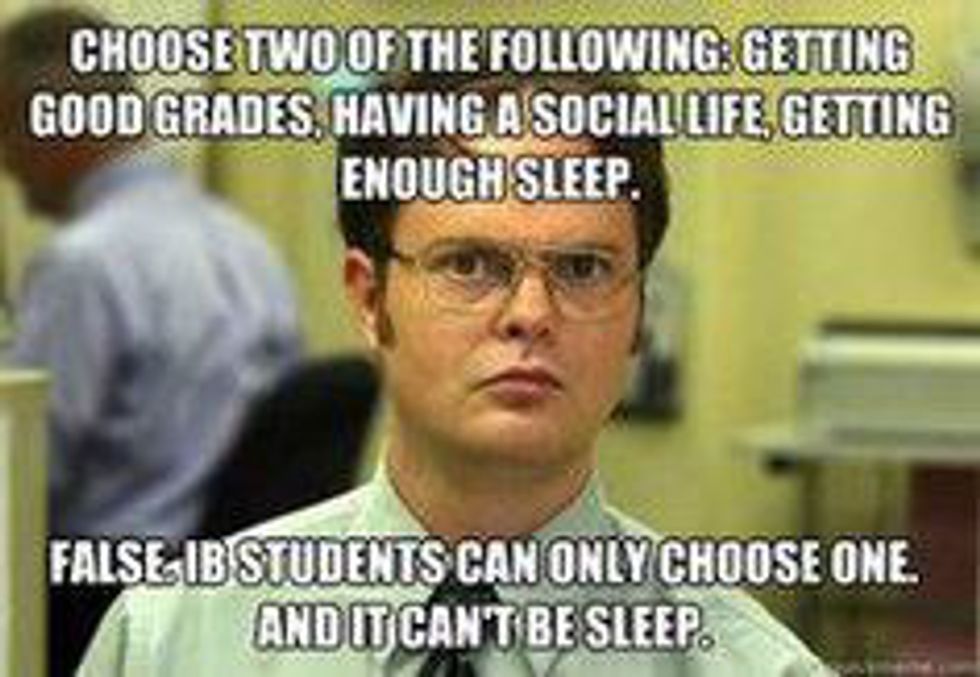The International Baccalaureate Program (IB) is one of the most rigorous secondary education programs in the world. Although throughout the United States, it doesn’t yet have the same name recognition as Advancement Placement Classes (AP), many universities in the United States are now accepting IB class credit from high school. This is great, seeing as all the hell IB students go through shouldn’t be for nothing!
IB students share a very strenuous, common experience. Looking forward to the program is to be expected from eighth graders and underclassmen who just don’t know any better… Looking back on the experience, you wonder how you ever made it out alive, as it felt like you were dying many times over on the inside. Nonetheless, with all the stress IB brings, the benefits far outweigh the costs! Here is a lighthearted look back at those times in the IB Program.
1. You took “senior classes” early because there was no time later.
Looking at your potential IB schedule as a high school freshman, you undoubtedly noticed that you’d be very busy your last two years of school. Your guidance counselor also knew this, and informed you that you would need to take certain required “senior” classes as a freshman and sophomore (assuming there are no IB classes that can count toward your general graduation requirements). You must do this while also having to take the expected “freshmen” classes that lead up to standardized tests which you’re supposed to pass in order to graduate someday. I remember my economics and American government classes being halfway filled with seniors, and halfway filled with pre-IB students. Granted, you probably didn’t have any trouble in these classes - as underclassmen anyway. Taking these classes earlier than other students automatically begins to distinguish IB students from non-IB students. Which takes us to...
2. You could easily tell IB students from non-IB students.
If you went to an all-IB school, then you may not have experienced this phenomenon, but the school I went to felt very much like two separate schools. Now, the non-IB students weren’t bad students - in fact they were still some of the best in the school corporation. Yet, there was still a hard line drawn between these two groups of pupils. The majority of IB students really cared about their education, while a lot of the “regular kids” just didn’t live and die by the book. As a result, IB students were treated much differently than other students, usually much better by teachers and school administration. Whether this was intentional or not (I hope it wasn’t), it was very evident to everybody. It probably stems from the fact that the stereotypical “good kids” are allowed to get away with much more because they don’t usually act out to begin with; and besides, they deserve to act out once in a blue moon, right? So, perhaps it’s not IB kids being treated better, but it’s the “better students who happen to be IB students” receiving better treatment. After all, you’d be very hard pressed to find an IB student graduating with less than cum laude status.
3. Your IB teachers were either super sympathetic, or utterly bullheaded.
There was no in-between, IB teachers were either very understanding of students’ situations, or they only seemed to care about their own class. I had a wonderful IB English teacher who probably understood the stress of IB better than any other educator. She knew that if we were absent from class, we had a good reason for it, and weren’t just skipping. Then there were those *ahem* other IB teachers. I swear, these teachers couldn’t care any less about other classes, and they seemed to believe that their class should be the ultimate priority in every IB student’s life. Those teachers who wouldn’t even let you do homework from another class after you had finished their class work. Hopefully you had more of the former than the latter.
4. You went through TOK, CAS and EE: the lethal injection.
The theory of knowledge class (TOK); community, action and service hours (CAS) and the extended essay (EE) were the final death sentence for an IB student, just like the three vials of toxins used in a death row lethal cocktail. These are done in addition to all of your IB classes you have to take. I won’t go into detail with them, as it may trigger some bad memories, but as any IB student can tell you, these three requirements desensitize you to reality, make you effectively comatose and take everything out of you. You wake up on graduation day wondering exactly how you got though such expectations.
5. The IA's caught you and everyone else by surprise.
At least IB is up front with you about the impending death sentence mentioned above, but internal assessments (IA's) seem to take all IB students by surprise. IA's are essentially ways of telling how well-versed a student is in each subject area. Going back to introductory IB talks, I did hear IA's mentioned, but it was quickly mentioned, and not talked about in detail. Many times, IA's involve oral interviews, written critiques and a whole lot of other tests depending on the subject; they are almost never one test, but usually consist of two or three parts. As if things seemed overwhelming before, enter the internal assessments! But we all plowed through them, nonetheless.
6. You went out on the town with other IB friends in between exams.
IB exams were one of the most hectic, and yet one of the most freeing, times of an IB student’s life. A lot of IB schools cancel class while exams are going on, and even though my school did not (because it was not an exclusively IB school), we did nothing in the majority of our IB classes during that month of May anyway. So, since our classes were virtually cancelled, and we had the six hours before off school to “study,” we didn’t see much of school in the month of May. Yes, this time off was technically time to study - but frankly, at that point you either knew your material or you didn’t, so studying was not going to help one way or the other. So, what did IB kids do in this time off? Well, most of us went out on the town. We went out to lunch, went to the zoo across the street from school, etc. This was a nice, relaxing time in-between test sessions used to de-stress. Actually, these times were probably more therapeutic for IB students than if we had actually used that time to study.
7. You know that nothing gets done after IB exams.
Once you go off for IB testing, your teacher’s job is essentially done. They either incorporate your IB performance into your final exam grade, or they often give you a ridiculously easy final exam because they know the IB exam is more important and they don’t want you to worry about your transcript grade. Plus, they don’t want to have to do any more than what they have already done through the year preparing you for those exams. On the other side, once the IB exams are done, IB students have nothing left in them. The last few weeks are usually reserved for barbecuing, parties and looking forward to graduation. If you’ve gone through or taught IB, then you know exactly what this all feels like. Don’t be ashamed of taking it easy after the exams, everyone does!
8. You conclude that sleep is for the weak.
Oh yeah, you remember what sleep is? Well, forget it, because you’re not getting any of it! Seriously, there are times when you have so much to get done and so little time to do it. No wonder IB kids doze off and bounce awake in class. We’re not bored, we’re sleep-deprived! Many times, an IB essay has been turned in, stained with tears. IB definitely gives you a new appreciation for sleep!
9. Your class probably had multiple valedictorians, and they were all IB students.
My class alone had a record 10 Valedictorians. Granted, I feel that having multiple valedictorians defeats the purpose of a valedictorian altogether, but it is nice to see 10 of your friends up there giving some advice you know they’re probably making up on the spot, like any good IB student would. They do us proud, indeed! Many schools have a weighted grading system to combat producing multiple valedictorians, but at the same time, how are you going to deny the honor to a 4.0 IB student? Having gone through IB is tough enough, and they graduated with a 4.0, give them the honor, I say!
10. You can BS an argument for anything, and it sounds good.
There is a common phrase, “IB, therefore I BS.” I’ll fess up and say there is a lot of truth to that; but at the same time, I can admit that attempting to BS something has brought me upon several stunning revelations in many areas of study. So, maybe BS-ing is a virtue? Case in point, IB teaches you the skills you need to make any argument. It’s one of the reasons why my high school also had the best mock trial program in the state! As you go on through life, “fake it till you make it” seems more applicable day by day. Good on IB for teaching us some solid truth!
11. College can seem easier than IB at times.
This can greatly vary depending on where you attend undergrad, but there is no denying that IB thoroughly prepares you for college. The curriculum itself is modelled after a school of liberal arts and sciences. This is why many IB students know the relative direction they want to take in college and their professional careers. In my experience, the training I got from IB has been priceless. College has been a relative breeze - not because it’s easier, but because I’m used to it.
12. You have a more open view of the world.
The IB program dramatically changed my worldview in so many ways, and it is probably the single greatest takeaway from the program! Going into high school I was very close-minded, and looked down on other worldviews as inferior to mine. Now, as Holden Caulfield puts it, I realize that “we’re all phonies,” but we’re all trying to do the best we know how. In retrospect, the IB program changed me as a person probably the most out of anything else in my academic career. IB didn’t necessarily teach me what to think, but it taught me how to think, and that has made all the difference in my life. I hope other former IB students can say the same!




